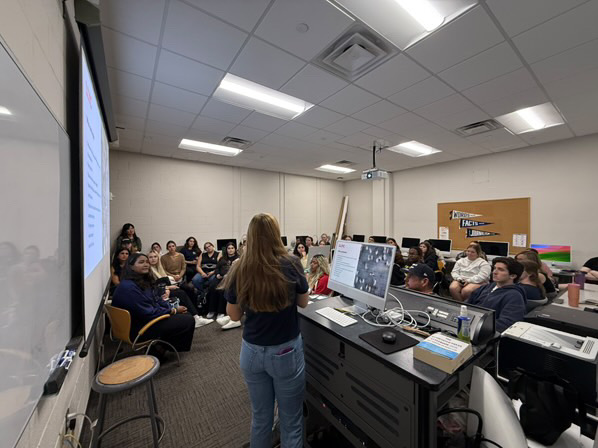
Following the results of the tumultuous election, many questions have been raised in our society — these are discussed and explored in the play “Pipeline” written by Detroit local Dominique Morisseau, which opened on Nov. 14, 2024, in the Varner Studio Theatre.
“Pipeline,” directed by Lynch R. Travis, follows single mother and exhausted teacher Nya as she deals with different aspects of her life that all yearn to be her main focus — her students, her son and her ex-husband.
The play begins with Nya — played by DeNetria Gibson — attempting to call her son’s father to no avail. Upon getting his voicemail, Nya has a comedic yet dreadful moment where she has to leave a message detailing how their son is in hot water.
Nya’s son, Omari — played by Christian Brannon — is facing school expulsion and possibly legal charges after a physical altercation that isn’t explained until later on in the play.
Omari and his girlfriend Jasmine — played by Nea Lynn — then have a philosophical discussion on what it means to be in a relationship and what it means to be a teenager of color in a primarily white institution. Much to Jasmine’s dismay, Omar decides to run away.
The play dissects the poem “We Real Cool” by Gwendolyn Brooks while projecting it onto the background wall of Nya’s classroom as she teaches it to her students and is mirrored with Omari who constantly repeats it.
“Pipeline” is a reflection of “We Real Cool,” with the poem discussing Black teenagers who rebel against the school by skipping, partying and staying out late before meeting a tragic fate. The poem brings forth the same issues Omari faces in the play. The comparison is striking and adds depth to the topic at hand. The creativity of the poem projection — both literally and figuratively — make for a dynamic watch.
The set is relatively simple, but well-constructed and fills the theater with purpose. Each set change and prop location have a meaning, while simultaneously shape-shifting into its designated space. Varner Studio Theatre also makes the play more intimate.
The lighting was another really cool aspect that shapes the audience’s perspective on the characters true intentions and inner thoughts. For example, while a character is being hospitalized in a nerve-wracking scene, the lights are flickering red — resembling a heartbeat.
The characters also felt entirely genuine, and the relationships and dynamics of the characters worked more than well. Each actor performed exceptionally and delivered lines with passion and purpose.
Some monologues truly stuck with me, like Jasmine’s monologue about what it means to be the child of a parent and Nya’s counter monologue on how it feels to be that parent that would do anything for their child.
Characters like Nya’s friend and fellow teacher Laurie, school security guard Dun and Omari’s father Xavier all complete the world building and drive the plot forward with added humor, drama and excellence.
The play feels authentic, and it’s not just one particular section that helps it do so — but rather the crew, the techs and everyone in between that elevates the play so that it sticks with the audience once they leave.
If you haven’t yet caught “Pipeline” in action, it’s not too late. You can purchase tickets on the Oakland University events page and also check out other upcoming events like “The Thanksgiving Play.”











